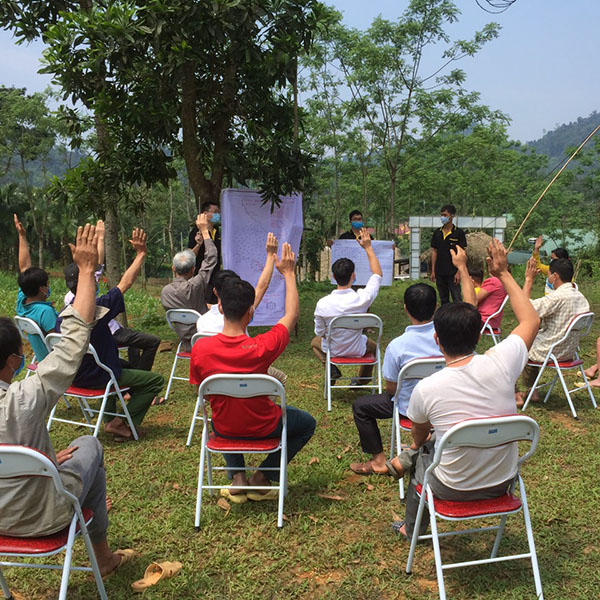Stories of Change

A meeting in Cao Binh to discuss the new water system.
Fair water access promotes peace in Cao Binh, Vietnam
Most of the people who live in Cao Binh village are from the Tay ethnic group, Vietnam’s largest ethnic minority. The name of their village comes from its location in the mountains of northwest Vietnam: “Cao” means “high” and “Binh” means “flat.” So, it’s the flat area on a high mountain.
Cao Binh’s residents use a small stream about a mile from the village center as their drinking water. The stream’s flow changes seasonally, so families often face water shortages. This is especially true in the dry season from December to March.
Not surprisingly, facing so many water shortages means that people don’t care much about water quality. They are only able to focus on quantity.
As a result, there was often tension and conflict among neighbors over water, especially during shortages. And, since families haven’t traditionally shared water among themselves, things could get pretty bad. Better-off households had money to build simple pipelines to tap upstream water, which left poorer families with little or no water downstream.
With the financial support of the CWS family, CWS staff joined community leaders early this year to find a way to address the problem. Together, we conducted what’s called a “community needs assessment” and surveyed households about their water needs and usage. With findings in hand, Cao Binh’s official leader Mr. Thang met with Women’s Union members, school leaders, other villagers and People’s Committee leaders. And, with our team, they brainstormed, discussed and planned a solution to their water crisis.
In two community meetings, everyone had a chance to share ideas. Then, a consensus emerged: a gravity-fed pipe system was the best way forward. A total of 43 families registered to join a new Water Users’ Group. Importantly, they also agreed to contribute their labor to dig trenches and transport materials. Additionally, each family agreed to pay 300,000 Vietnamese dong ($13) to buy a water meter and small pipe to connect the main pipe to their house.
An operation and maintenance team was also formed. Everyone agreed on a three-person team. Then, water use fees were agreed for operations and maintenance costs. Each family agreed to pay 1,000 dong (about 4 cents) per cubic meter of water used for the first 20 cubic meters, and 2,000 dong if they used more water. After these agreements, CWS helped the team create a water use and fee collection record system to ensure transparency.
Recently, Mr. Thang told our team, “People are now satisfied with the water supply system. It is well designed and, as planned, easy to use and maintain. With meters, people are more responsible in using water. Also, homes at the end of the pipeline now have enough water. And village solidarity is improved and conflicts over water no longer happen.”
